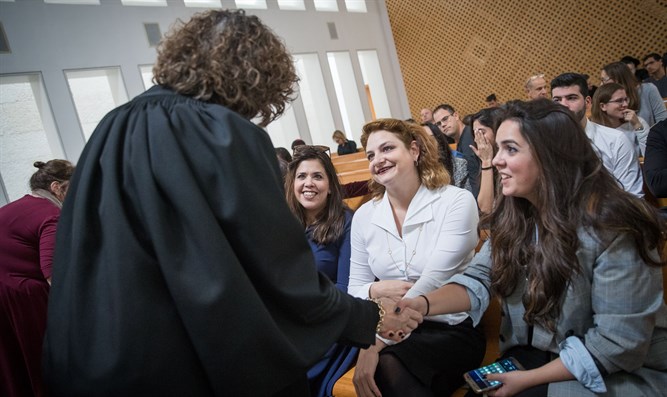Supreme Court favors women competing on haredi list
Expanded panel of justices rules Agudat Yisrael must expurgate from party articles clause preventing women from competing for place on list.
Mordechai Sones, 31/07/18 15:57
At a hearing held in a special expanded Supreme Court panel headed by Chief Justice Hayut and Justices Meltzer, Hendel, Fogelman, and Kara, the judges issued a decision in the framework of the petition against the haredi Agudat Yisrael party, ordering it to change a clause in its bylaws to allow including women as candidates in the party’s Knesset list.
During the hearing, Nivcharot legislative branch head Racheli Rochgold suddenly flared at the judges and cried: “I’m sitting here in the hearing and they’re discussing deep legal arguments, while I’m asking the honorable judges to discuss a matter of life and death! I can’t help myself and I have to shout what’s in my heart for all the haredi women, for my daughters, for their future – because here it will be decided. We have no representation in any areas that concern us: women’s medicine, sexual abuse, hygiene. We’re invisible.”
The Supreme Court ruled this morning in the petition against the Agudat Yisrael party, ordering the party to change its articles of confederation to allow women to be included as candidates on the party list immediately.
The actual decision means that by September 2, 2018, the Agudat Yisrael party must expurgate the discriminatory clause from its regulations, otherwise the matter will revert to the Supreme Court who will have to decide the issue without further delay.
The Nivcharot movement sees the decision as an “historical decision/opportunity, because it will bring about an amendment to an injustice against women originating in the days of the establishment of the State that contradicts the language of the Declaration of Independence: ‘In the State of Israel, the principle of equality was recognized in general and the principle of equality between the sexes in particular was recognized. The Declaration of Independence establishes the commitment of the new state to full equality of social and political rights for all its citizens, regardless of religion, race or gender,’ and the Women’s Equal Rights Law (1951), which aims for ‘full and total equality of women – equality in rights and duties, in state life, society, and the economy, and in the entire system of laws’. It should be noted that the law was recognized by the Supreme Court as having special status and is superior to ordinary law.”
The petition, submitted by attorney Tamar Ben-Porat in March 2015, relates to Section 6 (Membership in the Party) in the Agudat Yisrael Regulations and is also addressed to the Registrar of Associations who approved these bylaws, according to which “a party member can be: A Jewish man who is 18 years or older and observant of Torah and mitzvot, who is among those fearing G-d’s word and identifying with Agudat Yisrael and its goals, who subordinates himself to the Council of Torah Sages of Agudat Yisrael and accepts its authority upon himself.”
Attorney Ben-Porat sums up and says “the Supreme Court today has been given the opportunity to issue an historic ruling on the status of women. From the perspective of the judges in the hearing, so far it seems the Supreme Court believes the haredi practice severely violates women’s rights, and we’re optimistic that on September 2, as ordered by the court, a just verdict will be given. At the same time, we’ll honor the court’s decision to give Agudat Yisrael an opportunity to remove the discriminatory clause and to correct the injustice itself. If they don’t do so, the court will intervene and decide.”
Nivcharot co-founder and co-CEO Esti Shoshan also referred to the decision: “Nivcharot organization is proud to lead the revolution and for the fact we didn’t give up. We’re excited that the Supreme Court chose the path of equality and justice; it can’t be otherwise in a democratic state.”
Esti Rieder said: “It’s an historic day; it’s exciting to see a packed hall full of haredi women who for three years didn’t dream they’d have the courage to make noise and certainly not to sit in the courtroom and to ask it for relief.”
Source: Israel National News
